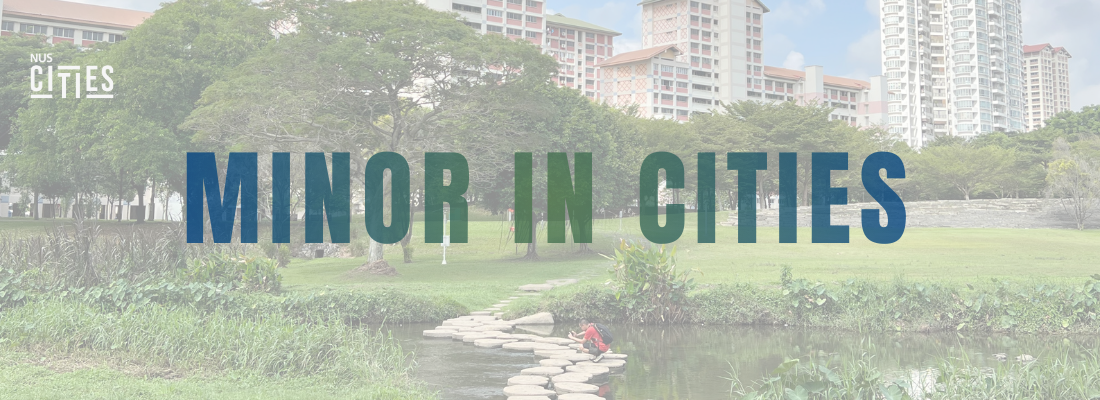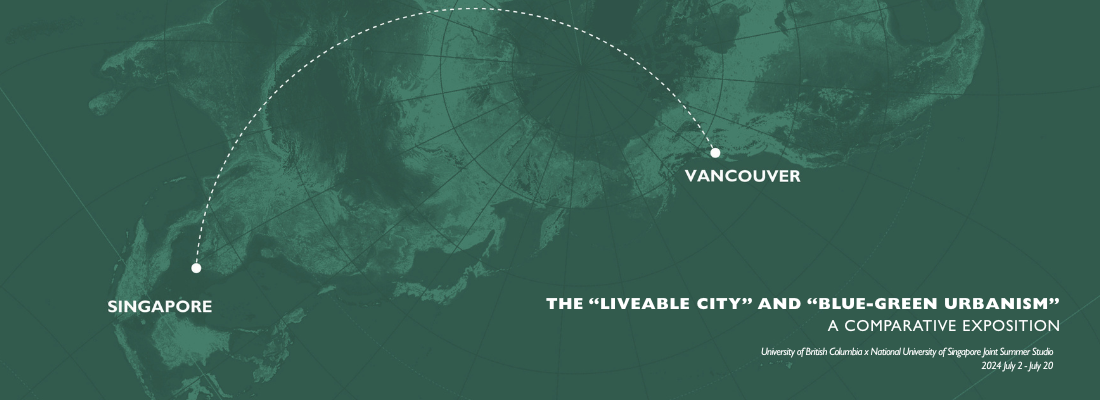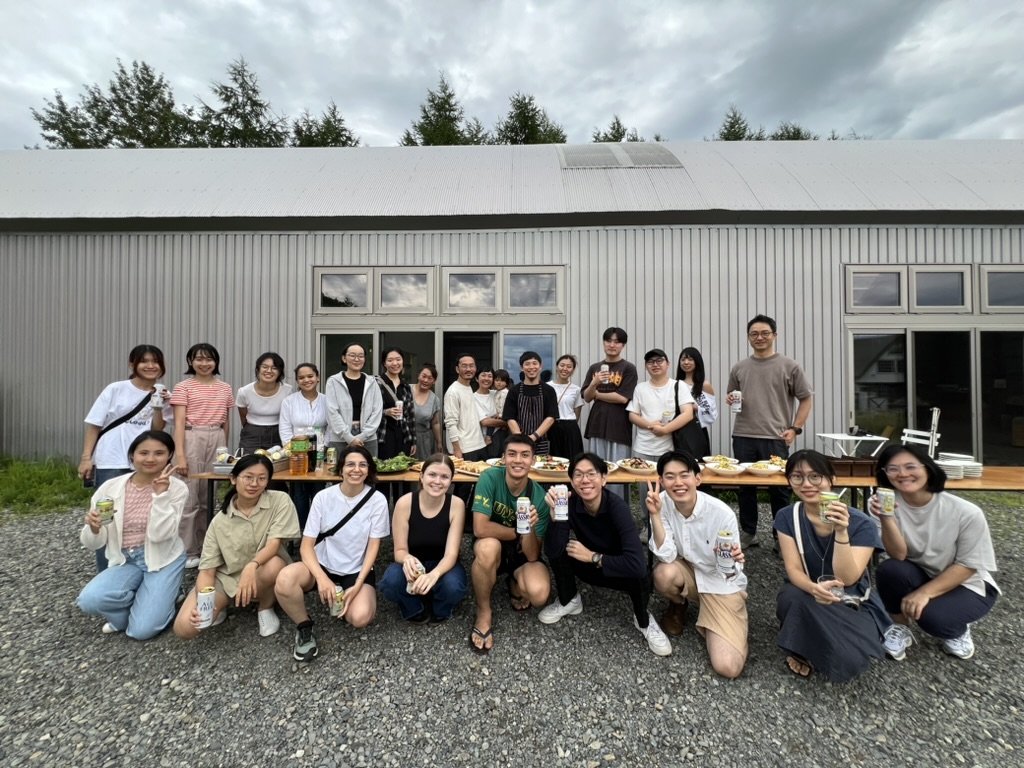Undergraduate
Stemming from the imperative to train students to understand how Cities can be made liveable amidst increasing urbanisation, Minor in Cities will build upon the Liveable Cities course to provide greater insight and analysis into the components of a liveable city.
It will provide a holistic and comprehensive lens in which students may understand how complex cities are, and that systems thinking is needed to resolve urban challenges, leading to integrated systems solutions that will attain liveability goals. The planned Minor in Cities will be largely case based with teaching being conducted by a mix of practitioners and academics.
Requirements
Effective from AY24/25 Semester 2 onwards.
For courses completed from AY24/25 Semester 2 onwards
To achieve a Minor in Cities, you must fulfil the following:
- Total Units: Complete at least 20 units of courses from the list provided below.
- NUS Cities Core and Elective: Complete CDE2501 and at least 2 NUS Cities electives (CDE-coded), selected from any of the 4 pillars.
- Courses from All Pillars: You must complete one course from each of the 4 pillars. While you may take multiple courses from a single pillar, only one course per pillar will be counted towards the Minor.
- Course Substitution: Courses CDE4501A and CDE4501B may substitute one elective from any of the 4 pillars. However, they cannot be used to replace CDE2501.
- For electives that have pre-requisites, please reach out to us at nuscities@nus.edu.sg prior to course bidding.
Information updated as of 13 January 2026.
For courses completed before AY24/25 Semester 2
To achieve a Minor in Cities, you must fulfil the following:
- Total Units: Complete the core course and at least 16 units of courses from the list of NUS Cities Electives listed below.
| SEMESTER 1 | SEMESTER 2 |
| Core Course | |
| CDE2501 Liveable Cities (4 Units) |
|
| NUS Cities Electives | |
| CDE3504 Smart Cities (4 Units) | CDE2502 Cities for All (4 Units) |
| CDE3505 Planning and Governing Cities (4 Units) | CDE2503 Cities in Nature (4 Units) |
| CDE4501A Topics in Challenges of Cities (4 Units)** | CDE4501B Topics in Challenges of Cities (4 Units)** |
*Click on the courses for the respective course writeups and descriptions.
**These courses are dependent on visiting professorship and may not run every semester.
Eligibility
The Minor in Cities is open to all undergraduate students in NUS with strong interests in urban planning, policy and governance. Students can declare their interest no later than the end of the 5th semester of their study.
For double counting of units for other programmes, refer to the guidelines listed here: Minor Programmes - NUS Bulletin
Students can be admitted to Minor programmes at the point of admission to NUS, or by applying/declaring to the relevant Faculties/Schools no later than the end of the fifth semester of study. Requests to declare a minor after the fifth semester will be considered on a case-by-case basis.

Our core course, CDE2501 Sustainable Systems for Liveable Cities, introduces students to the principles of liveable cities and the urban planning systems used to achieve them, using the Liveability Framework (LF) as its founation. Through seminars, students explore themes of Cities for All, Cities in Nature, Smart Cities, and Planning & Governance, delving into topics like climate change, heritage and inclusivity.
Seminars, led by practitioners and domain experts, provides insights into urban systems approaches, while studio sessions offer hands-on opportunities to apply theoretical knowledge to real-world district studies. Working in interdisciplinary teams, students learn to integrate the expertise of urban policymakers, planners, architects, engineers, and real estate professionals to achieve liveable city outcomes.

We also launched our Liveable Cities Best Project Competition last academic year to encourage students to build better and liveable cities through their group projects within the course. This award is proudly sponsored by DP Architects and the Urban Land Institute.
Read more about the winning teams here:
AY23/24 Semester 1
AY23/24 Semester 2
NUS Cities collaborates with several universities to provide students with global exposure, allowing them to work alongside local students, stakeholders, and professors to address urban challenges. The summer programs offered are short-term, typically culminating in site visits and a final studio project. These programs are scheduled during NUS's vacation period, enabling students to broaden their horizons without disrupting their academic commitments.
Currently, the summer programs offered by NUS Cities are non-credit bearing, and fee-paying where students are responsible for their own airfare, accommodation, visa (if required), and living expenses.
Application Process:
- Watch for email announcements from NUS Cities in January or early February calling for applications.
- Interviews may be required, and attendance is compulsory. Details of interview slots will be sent separately.
The "Liveable City": A Comparative Exposition
Read insights from the 2025 programme iteration here!
Explore the full 2025 Summer Studio Compendium through the image below – featuring student works and the teaching team's experience!
Read insights from the 2024 programme iteration here!
Explore the full 2024 Summer Studio Compendium through the image below – featuring student works and the teaching team's experience!
NUS - UTokyo Hokkaido Summer Programme 2024
Memu Earth Lab











